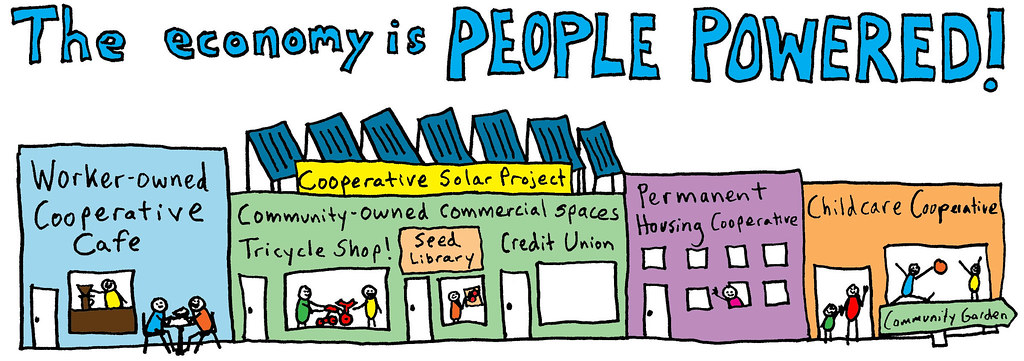Becoming Human: Celebrating Massachusetts Cooperatives

Photo: Sustainable Economies Law Center/ Flckr.com (CC BY-SA 2.0)
Editor’s note: This is the third in a series of articles that we are posting in recognition of National Co-op Month. See our first entry in the series here and our second here.
It’s October and that means it’s National Cooperative Month!
Massachusetts has an incredibly rich cooperative history, as well as thriving movements to build cooperatives and cooperative ecosystems and interdependent economies. The number of worker-owned cooperatives in Massachusetts grown significantly in recent years.
There are many benefits that worker-owned cooperatives bring to workers and communities. Worker-owned cooperatives tend to be more socially and ecologically sound than conventional businesses. They build community wealth and put workers in control of their own working conditions. Worker-owned cooperatives dispense with the class process of exploitation; since workers are the owners, they get decide what to do with the profits that they make. Worker-owned cooperatives help workers and communities rethink and reimagine the nature of work and, potentially, can help cultivate ecological well-being.
In the following report, researched and written for the Solidarity Economy Initiative and in dialogue with the Coalition for Worker Ownership and Power, Erwin Li positions worker-cooperatives as important strategies to create caring, democratic, empowered community economies. The report is directed towards the city of Boston, but Li gives important insight and recommendations that can help inform how organizers, policy-makers and community members in any community can work together to create municipal level strategies for cooperative development.
Cooperatizing Boston: Advancing Municipal Support for Worker Ownership
Each edition of Becoming Human will feature an article, reflection, interview, poetry, or other types of expression that engage with a creative community or municipal effort. These will include original features that discuss a local initiative and also stories about efforts in other parts of the world that we might learn from. The growing narratives, relations, and power from which other worlds are being assembled, maybe, can help reorient our hope and desire—and resignation—away from the death drive of white supremacist, heteronormative, capitalist modernity, and towards an open, uncharted horizon of radical egalitarianism and towards the reality that other worlds are in the making or already here. For the full introduction to Becoming Human that appeared in its inaugural column, look here. For a listing a previous columns, look here.
Acknowledgements: This column is in dialogue and solidarity with numerous collaborators and comrades including Vin Lyon-Callo, Meredith Degyansky, Penn Loh, Stephen Healy, students in Anthropology 340 – Other Economies are Possible, Anthropology 341 Building Solidarity Economies, Anthropology 597CC Community, Commons, Communism, and the pluriverse of world-making and world-defending efforts, movements, and projects in Massachusetts and around the worlds.
